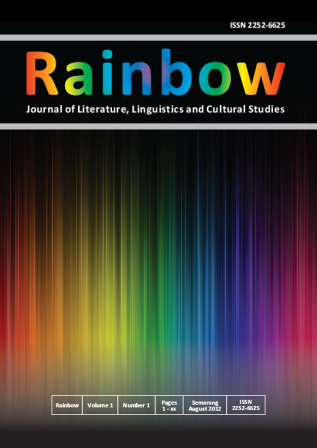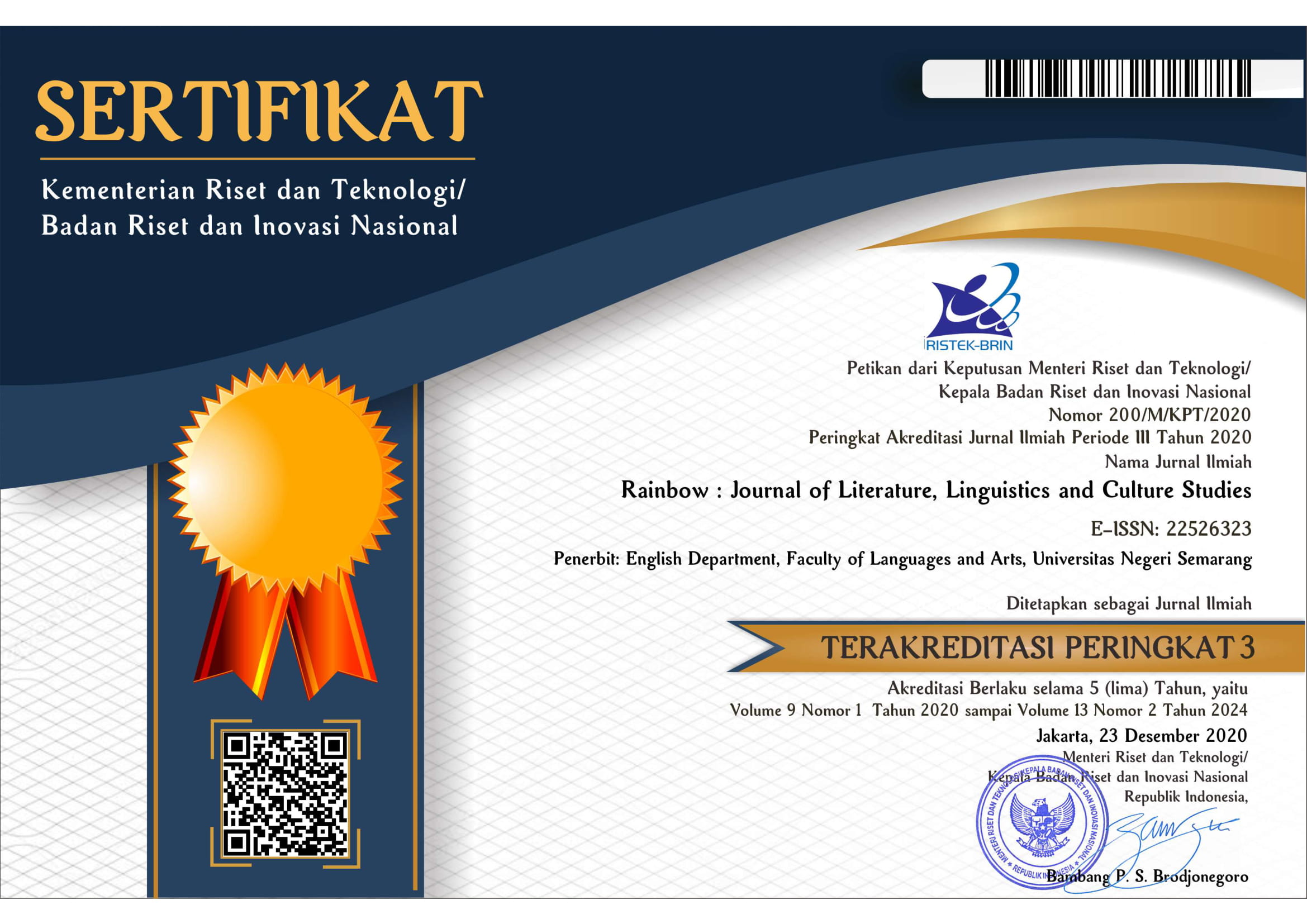DYSTOPIA AND ORWELL’S PITFALL IN GEORGE ORWELL’S 1984
Abstract
George Orwell was ranked as one of the most influential English writers of the 20th century and as one of the most important chroniclers of English culture of his generation. George Orwell as a socialist criticized over a state or a government that claimed that, they are ideologically socialism. In this study, I discussed Dystopia and Orwell’s Pitfall in George Orwell’s 1984. Dystopia is an antithesis of utopia. If utopia is life of a society where a world in safe, happy, and others which are representing all of human dreams, it reflects the desire for seeking the age of the Queen of Justice, then dystopia is the world that became the symbol of human rights destruction of every man with their powerlessness and a hopeless life. This final project is aimed at how totalitarian dystopia reflected in 1984, what are the factors of George Orwell’s idea in 1984, and to identify how George Orwell’s adjusts himself due to his political position. I employ George Orwell’s 1984 as the object of this study. This study is a descriptive qualitative study with sociology in literature approaches. It is descriptive qualitative since the data of the study are in the form of phrases, sentences, narrations and dialogues and I do not employ computation. The data are gained by reading the novel thoroughly, identifying, and selecting. This investigation results in several findings. First, dystopia is really portrays in 1984 as the world deprivation. Second, Orwell wanted to show that basically people have a strong will to look for justice, love, truth, and solidarity. Third, Orwell wants socialism life is not a pure socialism, but socialism which represents the society that has freedom of speech. It can be concluded that Orwell is undogmatic socialist.
References
Adi, Bani. 2012. Oratory as The Instrument of Totalitarian Regime’s Hegemony as reflected in George Orwell’s Animal Farm. Final project. Semarang: Universitas Negeri Semarang.
Ash, Timothy. G. 2001. Orwell for our time, London: The New York Review of Books.
Ayunda, Nenin. A. 2006. The Capitalist Dominance Found in Shirley Jackson’s “The Lotteryâ€. Final project. Semarang: Universitas Negeri Semarang.
Andrent, Hannah. 1951. The Origins of Totalitarianism. Ohio: The World Publishing Company.
Beaumont, Matthew. 2006. Cacotopianism, the Paris Commune, and England’s Anti-Communist Imaginary, 1870-1900 London: University College London Press.
Bressler, Charles E. 1999. Literary Criticism. Upper Saddle River, New Jersey: Pearson Education, Inc.
Buddicom, Jacintha. 1974. Eric and Us, London: Leslie Frewin Publisher, Ltd.
Conquest, Robert. 1990. The Great Terror: A Reassessment. London: Oxford University Press,
Crick, Bernard. 2004. Eric Arthur Blair: Oxford Dictionary of National Biography Oxford: Oxford University Press.
Donawerth, Jane. 2003. Dark Horizons: Science Fiction and the Dystopian Imagination. New York: Routledge.
Eagleton, Terry. 1991. Ideology: An Introduction. London: Verso Press.
Haycock, David. 2012. I am Spain: The Spanish Civil War and the Men and Women Who Went to Fight Fascism. London: Old Street Publisher, Ltd.
Huberman, M. and Matthew B. Miles. 2007. Qualitative Data Analysis. London: Sage Publication Ltd.
Marx, Karl and Frederick Engels. 2007. The Communist Manifesto. New York: International Publishers.
MMcKenna, Erin. 2001. The Task of Utopia: A Pragmatist and Feminist Perspective: Rowman and Littlefield Publisher, Inc.
Moleong, L.J. 2004. Metodologi Penelitian (Revision Ed.). Bandung: PT. Remaja Rosdakarya.
Ollman, Bertell. 1998. Market Socialism: The Debate Among Socialists. London: MacMillan Education Limited.
Orwell, Sonia and Ian Angus. 1971. Collected Essay, Journalism, and Letter of George Orwell. London: Martin Seeker & Warburg Limited.
Roden, John. 2001. George Orwell: The Politics of Literary Reputation. New Brunswick, New Jersey: Transaction Publisher.
Roberts, Edgar V. 2003.Writing about Literature (Xth edition). Upper Saddle River, New Jersey: Pearson Education, Inc.
Roskin, Michael G, et al. 2008. Political Science. Upper Saddle River, New Jersey: Pearson Education, Inc.
Shelden, Michael. 2010. The Modern Scholar: World of George Orwell, Indianapolis: Recorded Books, LLC.
Stansky, Peter and William Abrahams. 1994. The Unknown Orwell. Stanford: Stanford University Press.
Wellek, Rene and Austin Warren. 1973. Theory of Literature. New York: Harcourt, Grave Jouvan Inc.
Wengraf, Lee. 2002. The Orwell we never knew. London: ISRC Press.
Yeo, Michael. 2010. Propaganda and Surveillance George Orwell’s 1984: Two Sides of the Same Coin. Quebec: Global Media Journal.







